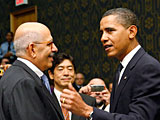Bringing China to the Proliferation Party
By Frank O'Donnell, Graham Ong-Webb for ISN
In less than a week, the US will host over 40 nations and several international organizations at the two-day Global Nuclear Security Summit in Washington, DC. Even though the Summit is not designed to produce any binding agreements, there is still much at stake.
It is the last forum for the international community to iron out the basis for a constructive round of negotiations at the 2010 Nuclear Non-Proliferation Treaty (NPT) Review Conference two weeks later. There is a concern that another botched Review Conference - as happened in 2005 - will be a catastrophic blow to the global nuclear security agenda.
Indeed, the summit, whose mandate is to tackle the core challenges to nuclear security cooperation, serves as an excellent opener to the Review Conference. The three ‘PrepComs’ leading up to the Review Conference have either been marred by disputes or foot dragging.
The Summit is meant to be more collegial and informal. More importantly, it obliquely addresses the challenges to cooperation by focusing squarely on the threat of nuclear terrorism; a concern about which the international community can generally agree.
Already, three institutions and initiatives for combating nuclear threats have been identified: the Global Threat Reduction Initiative (GTRI), the external pageGlobal Initiative to Combat Nuclear Terrorismcall_made (GICT), and the external pageProliferation Security Initiativecall_made (PSI).
Implemented in 2004 and 2006, respectively, the GTRI and GICT - both aimed at securing vast stocks of dangerous nuclear material from Russia from scattering around the globe - have been progressing fairly well. Outstanding challenges pertain to the further sharing of information. Overall, progress is possible because the five NPT-recognized nuclear weapon states (NWS) can cooperate.
The PSI is a different kettle of fish. Inherent challenges are not about information-sharing but the legal and physical capacity to interdict third-country ships on the high seas suspected of carrying nuclear materials. Established in 2003, the PSI has become an integral element in US efforts to halt nuclear and missile proliferation. In addition to the five NWS, about 90 states subscribe to the PSI’s declaratory interdiction principles.
However, prominently absent is China. Progress has been stymied by Beijing’s refusal to endorse or join the Initiative. This has extended to preventing any explicit UN Security Council support. US proponents are reduced to arguing that the PSI is symbiotically related to - and therefore implicitly legitimated by - external pageUN Security Council Resolution 1540call_made regarding nuclear security. China and other holdout states currently restrict US hopes of the initiative becoming an institution with distinct legal status and improved internal coordination.
There may be more at stake than Beijing realizes. A recent external pagePSI naval exercise in Abu Dhabicall_made, Leading Edge 2010, involved over 30 states and implicitly signaled interdiction resolve to Iran. The PSI itself was borne out of North Korea’s proliferation activities.
The upcoming Summit will therefore feature renewed US efforts to secure Chinese support for the PSI. To do so, Washington must placate Beijing’s concerns about the impunity that the PSI gives to the US to conduct any naval operation anywhere. This may require refining the PSI through a more multilateral process.
Ultimately, both sides must look to the bigger picture. Clearly, effective nuclear security requires transcending the unhelpful distinction between counter-proliferation and non-proliferation.

